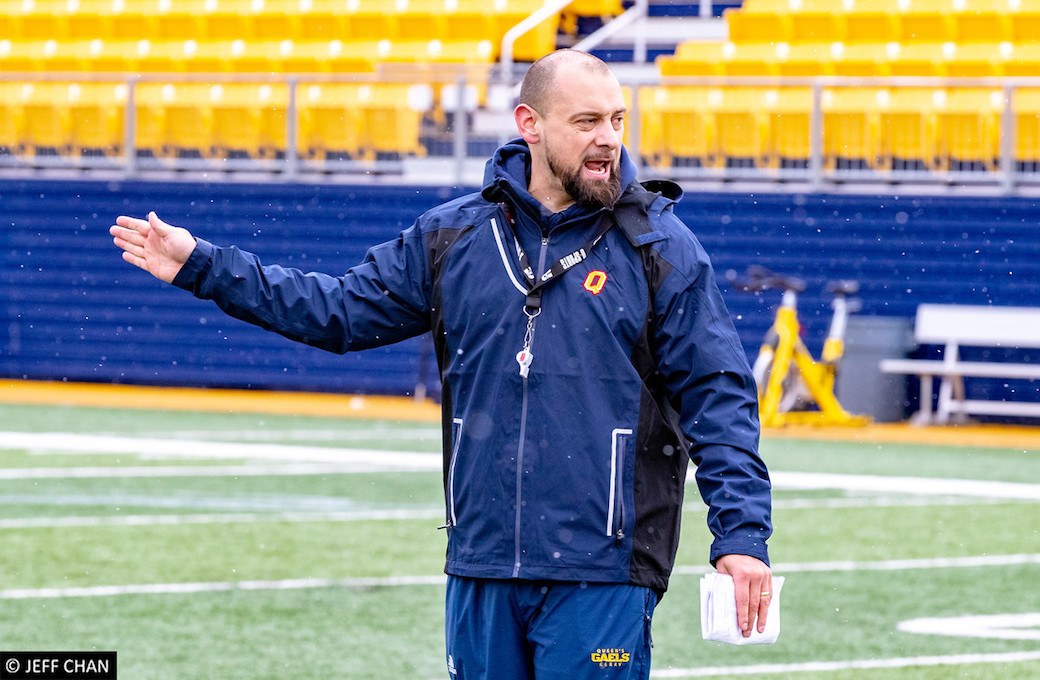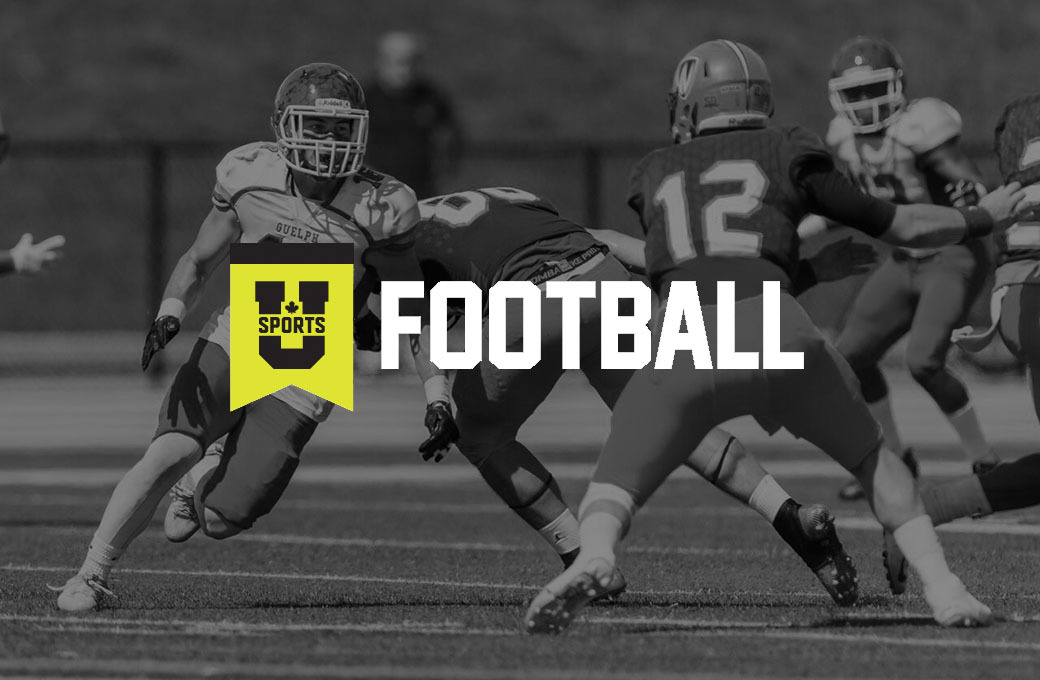Men’s Football
Getting to know your U SPORTS coaches: Steve Snyder, Queen’s Gaels


Andrew Bucholtz

U SPORTS held a full-day football strategy session Saturday in Markham, Ont., featuring a group of football leaders discussing key issues in the sport and identifying strategic focuses going forward.
Almost 90 invitees from across the Canadian sports landscape attended, including athletic directors, head coaches, and representatives from U SPORTS conferences, the Canadian Football League, Football Canada, high school football, the U SPORTS national office and more.
U SPORTS President and CEO Graham Brown said the day was a positive step forwards.
“We were able to bring all these people together to continue to look at ways to improve university football in Canada. …In the end, this is about our U SPORTS members taking the lead. Our members are willing to discuss the issues, we're not just sitting back, being complacent. A considerable amount of effort and hard work and good work went into putting the issues on the table for discussion, and we had every level of football in Canada investing time into this.”
The morning session of the summit included discussion of overarching issues and priorities, with input from a previously-taken member survey, then specific sessions focused on parity, competitiveness, athletic financial awards, financial regulations, and compliance. After a working lunch with a discussion of the U SPORTS Central system and the tracking of recruits’ official on-campus visits, afternoon sessions included national television strategies, possible playoff structure changes, football benchmarking and key performance indicators.
Gord Grace, the CEO of Ontario University Athletics, said the summit seemed to provide several areas where U SPORTS can take action shortly.
I think there was a great amount of consensus on compliance, rules and regulations, and that we need to up our game in how we hold people accountable and how we implement compliance across our system. The football coaches are in agreement and the (Athletic Directors) are in agreement, and that gives us real good direction on being able to implement something in the near future.
“I thought it was a positive day, a great dialogue between athletic directors and coaches and administration. I thought it was a solid day. Coming out of these things, you have all kinds of different ideas and opinions, but the challenge will be to cipher through that and make some good actionable plans out of it. I think we’ve got some things that we can start working on and implement in the near future, so that’s progress to me.”
Grace said he felt the discussion of compliance in particular saw a lot of unity.
“I think there was a great amount of consensus on compliance, rules and regulations, and that we need to up our game in how we hold people accountable and how we implement compliance across our system. The football coaches are in agreement and the ADs are in agreement, and that gives us real good direction on being able to implement something in the near future.”
Grace said he’s optimistic the discussions at this summit will lead to tangible results.
“There was a lot of good momentum,” he said. “I got a sense from coaches, other conferences and ADs that it was a good session today and that there was a lot of progress made.”
Basil Hughton, Canada West’s associate director for sport and football convenor, said this summit was important for bringing together all the U SPORTS football programs.
It was important to understand the issues and opportunities that present themselves at the U SPORTS level, and it was an opportunity to be in the room and strengthen our relationships with the group that’s got a shared common goal of growing football in this country.
McDonald - CFL’s vice-president of football operations and player safety
“It’s always good to get everyone in the same room. All schools were represented…The purpose of the day was to discuss directions for U SPORTS football moving forward, ways we can make it better from a whole bunch of perspectives. I think that goal was met in terms of discussion, and there’s now a leadership group that will take that away and make some recommendations moving forward.”
Hughton said it was useful to have representatives from the CFL, Football Canada and other levels there, as U SPORTS needs to closely work with all of them.
“The big issue across the country is the future of football, which is a much broader conversation that needs to involve the CFL and Football Canada.”
Kevin McDonald, the CFL’s vice-president of football operations and player safety, said it was useful for the CFL to be represented here (by both himself and CFL chief financial officer and head of football operations Greg Dick), as the league wants to help grow Canadian football overall.
“It was important to understand the issues and opportunities that present themselves at the U SPORTS level, and it was an opportunity to be in the room and strengthen our relationships with the group that’s got a shared common goal of growing football in this country.”
McDonald said U SPORTS football is important to the CFL, as a lot of CFL players come from Canadian universities.
“With the bulk of our Canadian content coming from U SPORTS programs, it’s critical that there’s a strong pathway from grassroots to U SPORTS and ultimately into the Canadian Football League.”
McDonald said he was impressed by the unified spirit of the attendees.
“There was a spirit of cooperation and willingness to work together to improve the product and make sure students are having a great experience.”
Chris Morris, the president of the Canadian University Football Coaches Association (CUFCA) and the head coach of the Alberta Golden Bears, said it was helpful to bring together so many people involved in Canadian university football for this discussion.
“It was good for all the football people involved with university sports to be in the same room and look at some of the challenges that we have, some of the good things that we have and see what we can do moving forward.”
Morris said the coaches and the coaches’ association have an important role to play in any changes.
“CUFCA has an instrumental role in what happens with U SPORTS football. The coaches, I think more so than any other group, have a firm idea as to what’s good and what are the challenges facing the sport. The tricky part is always getting coaches who are inherently worried about their own program and the competitive nature of that, getting them to look at the sport as a whole in the country and the health of the sport. I think lots of the guys did a good job of that today and were looking at ways for the sport to build its health and continue to expand in the country.”
Steve Sumarah, head coach of the Carleton Ravens, said the summit was useful in illustrating the different situations programs are in, and the magnitude of the task of improving Canadian university football.
“My biggest takeaway is that we are a very challenging group in a very challenging, diverse environment, and it’s going to take time and patience to get the outcomes we want. …This is more than a small project, it is a massive undertaking.”
Sumarah said he thought there was some progress towards those outcomes Saturday.
“Absolutely, there were steps, because we all got into the room and we all heard the stories and the challenges and the positives. I think we made huge progress, and I think we’re closer, but we’re not there yet.”
And Sumarah said more of these discussions with representatives from across U SPORTS would be helpful, perhaps especially if they came with discussion of what’s working for the different programs.
“There are some programs that are doing things really, really well. We need a best-practices type of day; I want to know what Regina’s doing, how they’re getting sponsors…Right now, we’re all sort of siloed. We need to work together; we’re stronger in a pack. And it’s how are we going to maximize what we have? We’re 27 schools with one common vision of how we want this to be successful.”
Morris said while it may take a while to implement change, this strategy session should be a key step in moving U SPORTS football forward.
“It’s not something that can be answered in a weekend; it’s one of those things where we need to go back and reflect on those things and look at the sport of football, what’s good about it, what are the things that drew us into playing this sport initially, what are the things the sport changed about our lives, and how do we provide that same experience for student-athletes that are participating today? I think a lot of those discussions are valuable, and a lot of that was happening today.”
Men’s Football
U SPORTS Staff
